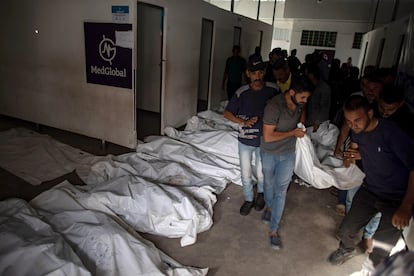Israeli bombing kills at least 45 in Rafah displaced persons camp
The attack caused a fire that spread through the precarious metal and plastic constructions. Most of the victims are women and children. It is one of the areas Israel designated a ‘humanitarian’ zone, according to the Palestinian Red Crescent

Two days after the International Court of Justice (ICJ) in The Hague ordered Israel to immediately stop its offensive in Rafah, an aerial bombardment led to a massacre on Sunday in Tel al-Sultan, one of the city’s camps for displaced people. The attack caused a fire that spread through the camp’s makeshift constructions, made from sheet metal, plastic and fabric. At least 45 people were killed in the strike, including 23 women and children, according to the count from the Gaza Ministry of Health, which is controlled by Hamas. The Israeli army is “reviewing” whether the “precise” targeted assassination of two local commanders of the armed wing of Hamas in the Tel al-Sultan camp also caused civilian casualties. According to the Palestine Red Crescent Society, it had been designated by Israel as a “humanitarian area,” meaning it was safe.
Most of the victims were reportedly burned to death or suffocated due to smoke inhalation. Images recorded by journalists and local residents show burned bodies, including those of babies and teenagers, while a fire consumes part of the camp. From dawn, there were images of the remains of charred tents, people mourning their loved ones and corpses wrapped or shown to the press.
One of the witnesses interviewed by the media, Muhamad Ahmed Abu Sibah, recounted that he had been in the camp for five months and until then, had felt relatively safe. Until this Sunday, when he was in his tent “between Maghrib and Isha [prayers]” late in the afternoon and heard an explosion. Then another. “It was at least two missiles. The fire started coming in this direction. There were burned cars, martyrs [killed]...,” he explained.
Israel struck the camp shortly after Hamas — the Islamist movement fighting in parts of Gaza that was responsible for the October 7 attack on Israel — made a show of force with its first barrage of rockets in four months against the Tel Aviv region. The attack showed that eight months of Israel’s invasion have not destroyed their ability to reach important and distant cities. Despite ICJ court order, the Israeli army has not lowered the intensity of its offensive in Rafah, and continues to bomb other parts of the Gaza Strip.
According to the Palestinian Red Crescent, Tel al-Sultan was not one of the areas that Israel ordered to be evacuated as part of its offensive on Rafah, which began on May 6. These evacuation orders, and the population’s widespread fear of a large-scale land invasion, had already pushed out many Gazans from Rafah, where they had been living for months in search of a refuse from the Israeli army’s advance in the north. An estimated 1.4 million people were living in Rafah, after fleeing from the nearby city of Khan Yunis. The United Nations estimates that 900,000 have left by force, some of them towards Al-Mawasi, the “expanded humanitarian area” designated by Israel, where international and non-governmental organizations have raised concerned about the living conditions.
The massacre in Rafah sparked small early morning demonstrations in various parts of the West Bank. In response, Hamas called on Monday for people “to escalate public activities of anger and pressure to stop the aggression and genocide war.”
“This massacre exceeds all boundaries,” said Nabil Abu Rudeina, the spokesman for the president of the Palestinian National Authority, Mahmoud Abbas, who stressed “the urgent need for an intervention to stop the crimes committed against the Palestinian people immediately.”
Sign up for our weekly newsletter to get more English-language news coverage from EL PAÍS USA Edition
Tu suscripción se está usando en otro dispositivo
¿Quieres añadir otro usuario a tu suscripción?
Si continúas leyendo en este dispositivo, no se podrá leer en el otro.
FlechaTu suscripción se está usando en otro dispositivo y solo puedes acceder a EL PAÍS desde un dispositivo a la vez.
Si quieres compartir tu cuenta, cambia tu suscripción a la modalidad Premium, así podrás añadir otro usuario. Cada uno accederá con su propia cuenta de email, lo que os permitirá personalizar vuestra experiencia en EL PAÍS.
¿Tienes una suscripción de empresa? Accede aquí para contratar más cuentas.
En el caso de no saber quién está usando tu cuenta, te recomendamos cambiar tu contraseña aquí.
Si decides continuar compartiendo tu cuenta, este mensaje se mostrará en tu dispositivo y en el de la otra persona que está usando tu cuenta de forma indefinida, afectando a tu experiencia de lectura. Puedes consultar aquí los términos y condiciones de la suscripción digital.









































